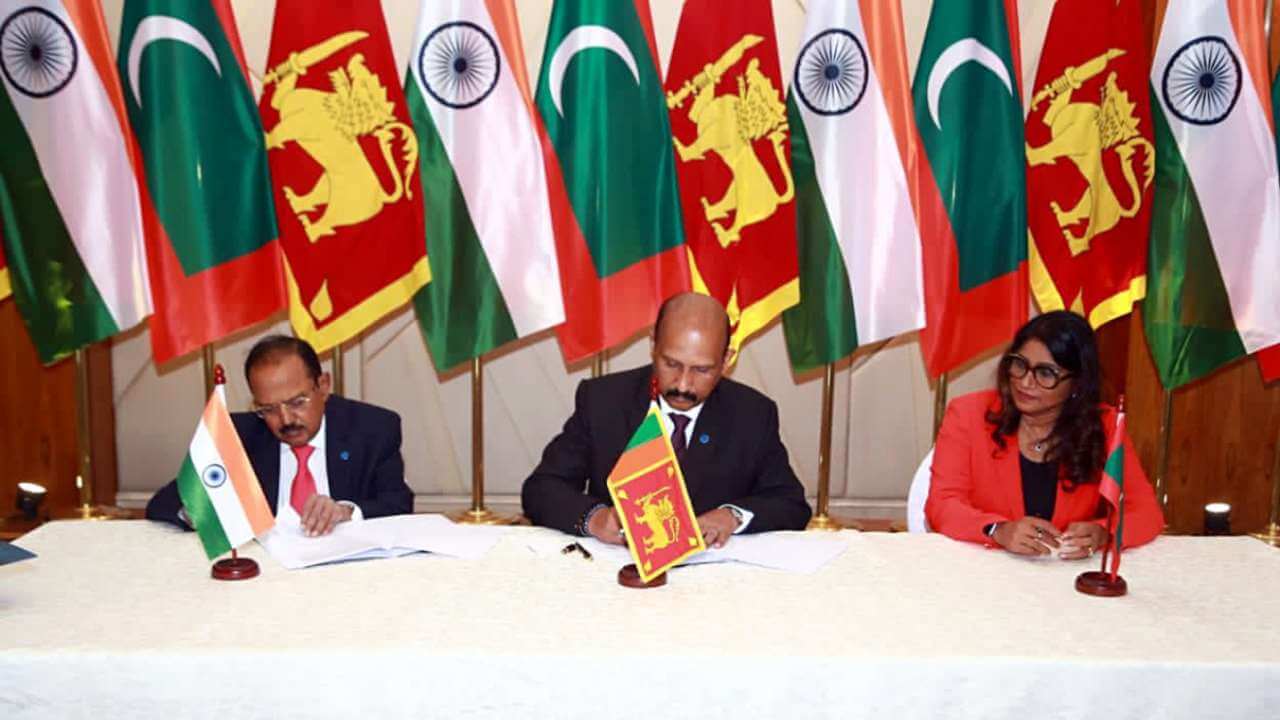Between November 27 and 28, representatives of India, Sri Lanka and the Maldives convened for the “4th National Security Adviser-level Trilateral Maritime Security Cooperation” meeting in Colombo. Indian National Security Adviser (NSA) Ajit Doval met with Maldivian Defence Minister Mariya Ahmed Didi and Sri Lankan Secretary of the Minister of Defence Kamal Gunaratne. Meanwhile, representatives of Mauritius and Seychelles also virtually attended the conference. The trilateral mechanism was reconvened this year after a six-year halt.
On the side-lines of the trilateral meet, Doval also held bilateral discussions with Didi and Gunaratne individually to discuss strengthening India’s bilateral partnership with the Maldives and Sri Lanka to deepen their strategic and security collaboration.
As a consequence of the trilateral meeting, the three sides agreed to bolster collaboration on the “common security threats” posed by terrorism and cybersecurity threats in the Indian Ocean region. They also agreed to expand their intelligence sharing and cooperate on issues such as “terrorism, radicalisation, extremism, drugs, arms and human trafficking, money laundering, cybersecurity and effect of climate change on the maritime environment.”
For India, this meeting was of great importance. To begin with, increasing collaboration between the two strategically situated island-nations in the Indo-Pacific is also beneficial for India’s ambition to counter China’s ongoing aggression in the region. Moreover, the trilateral meeting has allowed India to bring together two countries that have a significantly different approach to its ongoing diplomatic tiff with China.
On the one hand, President Ibrahim Solih has not shied away from exhibiting his acceptance of a greater role for India in the region. India has been increasingly concerned about China’s growing influence in the Maldives, which is now more vulnerable to China’s predatory economic policies after the COVID-19 outbreak severely damaged its tourism industry. With ex-President Abdulla Yameen spearheading closer ties with the East Asian giant, the Maldives gathered a debt of over $2 billion with China. However, over the past two years, since the election of President Ibrahim Mohamed Solih, India’s relationship with the Maldives has been “reset”. As a result of India’s “Neighbourhood First” policy, India has been working with the Maldives to boost infrastructure and connectivity. Consequently, in June 2020, India announced the commencement of a cargo ferry service, which was seen as an opportunity for India to emerge as the Maldives’ largest partner for trade.
On the other hand, Sri Lanka has taken a rather concerning approach to the Indo-China issue. Despite Sri Lankan Foreign Secretary Jayanth Colombage’s commitment to an “India first approach,” Sri Lanka has continued to increase its economic collaboration with China. Last month, President Gotabaya Rajapaksa announced his decision to work with China and achieve a “China-style development model for Sri Lanka.” He also vowed to change the “debt-trap” narrative that has been floated by several international experts.
However, India continues to work towards a greater Indo-Sri Lankan partnership. During a summit between Indian Prime Minister Narendra Modi and its Sri Lankan counterpart Mahinda Rajapaksa, he applauded the Rajapaksa brothers’ victory and celebrated it as a new chapter in the two-sides’ age-old friendship. This is also Doval’s second visit to Sri Lanka. He first visited the country in January, wherein he discussed improving cooperation in “defence, intelligence sharing and maritime security,” with the country’s President.
India, Sri Lanka, Maldives Agree to Bolster Maritime Security Collaboration
On Saturday, the National Security Advisors of India, Sri Lanka, and the Maldives convened for a trilateral meeting on maritime cooperation. Read more:
November 30, 2020

SOURCE: WION
